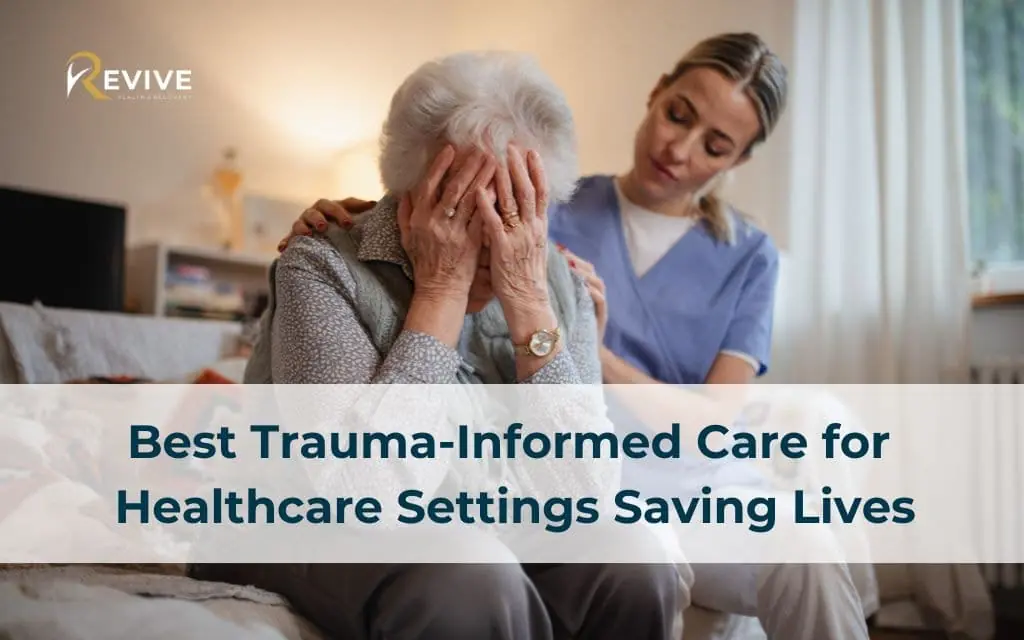Trauma-informed care for healthcare settings has become essential for Denver’s medical providers. This approach recognizes how trauma affects patient interactions with healthcare systems and transforms treatment delivery to prevent re-traumatization. When healthcare environments fail to acknowledge trauma histories, even routine procedures can trigger distress, compromising health outcomes.
This guide explores how Denver healthcare organizations can implement trauma-sensitive practices, examining both challenges and successes of this care model that’s revolutionizing healthcare delivery across Colorado.
What Is Trauma-Informed Care?
Trauma-informed care represents a fundamental shift in healthcare delivery. This approach recognizes that trauma affects many patients and adapts care practices to prevent re-traumatization while promoting healing. At its core, trauma-informed care rests on five key principles: safety, trustworthiness, choice, collaboration, and empowerment.
The framework requires healthcare providers to understand the widespread impact of trauma and recognize its signs and symptoms. Rather than asking “What’s wrong with you?” trauma-informed practitioners ask “What happened to you?” This shift creates space for healing through understanding.
In Denver’s healthcare community, trauma-informed care has gained recognition as an essential approach for effective patient treatment. Organizations like Revive Health Recovery incorporate these principles into their comprehensive care model to address both mental health challenges and substance use disorders. Many professionals seek to find training on trauma-informed care for healthcare professionals in Denver to enhance their practice.

Why It Matters in Healthcare
Trauma significantly impacts health outcomes. Research demonstrates that Adverse Childhood Experiences (ACEs) correlate with increased risk for chronic health conditions, mental health disorders, and substance use problems. Without proper recognition, healthcare settings can unintentionally trigger trauma responses through common procedures like physical examinations, restraints, or even standard intake processes.
Denver’s urban environment presents unique stressors that can compound trauma effects. From housing insecurity to community violence, many Denver residents experience ongoing traumatic stress that affects their healthcare needs and interactions with providers.
“Patient-centered care in mental health cannot exist without trauma awareness,” notes Dr. James Martinez, Clinical Director at Revive Health Recovery. “When we implement trauma-informed approaches, we see measurable improvements in patient satisfaction, treatment adherence, and overall outcomes.”
Healthcare providers who integrate trauma-informed care create environments where patients feel safe, respected, and empowered in their healing journey. This approach benefits all patients, not just those with identified trauma histories, by fostering dignity and collaboration in the care process.
The Need for Trauma-Informed Care in Denver
Understanding Re-Traumatization in Healthcare
Standard healthcare practices often inadvertently trigger trauma responses. Common practices like removing clothing for examinations, physical touch without clear consent, power imbalances in provider-patient relationships, and feeling physically trapped during procedures can reactivate trauma for vulnerable patients.
Re-traumatization occurs when environmental factors or interactions mirror past traumatic experiences. For example, a patient with a history of physical abuse may experience extreme anxiety during routine physical examinations. Without trauma awareness, providers might misinterpret this response as non-compliance or overreaction.
“Reducing re-traumatization in medical settings starts with awareness,” explains Sarah Thompson, trauma specialist at Revive Health Recovery. “Simple modifications like explaining procedures thoroughly, offering choices when possible, and respecting patient boundaries can prevent triggering trauma responses.”
Healthcare organizations must examine their policies, procedures, and physical environments to identify potential triggers. This assessment provides the foundation for meaningful changes that create safer healthcare experiences for all patients.
Denver’s Unique Healthcare Landscape
Denver’s population diversity creates specific trauma-informed care needs. The city’s growing immigrant and refugee communities often carry collective trauma from displacement and conflict. Additionally, Denver has significant veteran and unhoused populations with high rates of trauma exposure, alongside first responders who benefit from specialized trauma recovery programs for first responders.
Denver Health serves as the primary safety net for many vulnerable residents. Their trauma team reports treating approximately 18,000 traumatic injuries annually, with many patients carrying pre-existing trauma histories that complicate care.

COACT Colorado’s research indicates that 62% of Denver residents have experienced at least one ACE, while 27% report three or more ACEs—factors that significantly impact healthcare interactions and outcomes. These statistics underscore the critical need for trauma-informed care for healthcare settings in Denver.
Regional factors like Colorado’s substance use rates and mental health challenges further emphasize the necessity for trauma-awareness among healthcare providers. Denver nurses and medical staff must develop skills to identify trauma responses and adapt care practices accordingly.
Becoming a Trauma-Informed Healthcare Provider in Denver
Training and Certification Pathways
Healthcare professionals seeking to learn how to become a trauma-informed healthcare provider have multiple pathways available in Denver. The journey typically begins with foundational training in trauma concepts and moves toward specialized application in clinical settings.
For physicians, nurses, and allied health professionals, certification options include:
- The Trauma-Informed Care Certificate Program through the Colorado Healthcare Association (40 hours)
- Denver Health’s Trauma-Responsive Care Training Initiative (3-day intensive plus 6-month mentorship)
- Online certification through the University of Colorado’s School of Medicine (self-paced)
“Healthcare providers who want to expand their trauma competency should start with core education on trauma’s neurobiological impacts,” advises Dr. Helena Roberts, Education Director at Revive Health Recovery. “Understanding how trauma affects the brain creates the foundation for appropriate clinical responses.”
Organizations looking to enroll in trauma-informed care courses should evaluate programs based on their practical application components and ongoing support resources. Many Denver institutions offer consultation services to integrate training into practice settings.
Key Training Organizations
Denver professionals benefit from several high-quality training resources for trauma-informed practice:
The National Council for Behavioral Health offers their renowned Trauma-Informed Care Learning Community with Denver cohorts meeting quarterly. This program combines virtual learning with in-person skill development.
The Colorado Trauma-Informed Care Network provides specialized training for healthcare settings through their partnership with Denver Health. Their programs focus on practical implementation strategies for clinics, emergency departments, and inpatient units.

The Substance Abuse and Mental Health Services Administration (SAMHSA) maintains comprehensive trauma-informed care resources adapted for Colorado healthcare systems. Their materials include assessment tools specific to Denver’s diverse populations.
Dr. Sandra Bloom’s Sanctuary Model trainings are regularly hosted in Denver, offering healthcare organizations a comprehensive framework for organizational transformation.
Local resources also include the Trauma-Informed Care Collaborative of Denver, which hosts monthly learning sessions for healthcare professionals seeking to advance their skills.
Costs and Funding Opportunities
Implementing trauma-informed care requires investment across multiple domains. Organizations must consider costs associated with:
- Staff training and certification
- Environmental modifications (depending on facility size)
- Policy development and documentation updates (40-120 staff hours)
- Ongoing supervision and support (5-10% of administrative budget)
The cost of implementing trauma-informed care in healthcare settings in Denver varies based on organizational size and existing infrastructure. Small practices might invest $10,000-$25,000 initially, while larger systems like Denver Health have allocated over $1 million for comprehensive implementation.
Fortunately, Colorado offers unique funding opportunities through:
- The Colorado Health Foundation’s Trauma-Responsive Care Grants
- Denver’s Health Equity Innovation Fund (matching grants for qualifying organizations)
- Colorado Department of Human Services implementation funding
- Federal SAMHSA grants for trauma-specific initiatives
Organizations can offset costs through phased implementation approaches, starting with leadership training and expanding gradually to all staff and systems. Research demonstrates positive return on investment through reduced staff turnover, decreased patient complaints, and improved treatment outcomes.
Implementing Trauma-Informed Care: Best Practices
Creating a Trauma-Sensitive Environment
The physical healthcare environment significantly impacts patient experiences. Best practices for trauma-informed healthcare include:
Physical Space Considerations:
- Clear signage and navigation cues
- Private, soundproofed exam and consultation rooms
- Options for patients to face doors or have clear exit paths
- Calming colors, natural elements, and reduced institutional appearance
- Designated quiet spaces for regulation and de-escalation
“Environmental changes need not be expensive,” notes Michael Chen, facility design consultant for Denver healthcare organizations. “Simple modifications like adjustable lighting, privacy curtains, and comfortable seating can significantly reduce patient anxiety.”
Waiting areas deserve particular attention, as anticipatory anxiety often peaks in these spaces. Best practices for trauma-informed healthcare include offering estimated wait times, providing engaging but calming distractions, and creating separate areas for children and adults when possible.
Clinical areas should offer patients choices about positioning, lighting, and the presence of support persons. These small accommodations acknowledge patient autonomy and reduce power imbalances inherent in healthcare interactions. Creating a trauma-sensitive environment in healthcare requires ongoing assessment and adaptation based on patient feedback.
Patient-Centered and Culturally Competent Care
Effective trauma-informed care integrates cultural competence to address diverse trauma experiences. Denver’s multicultural communities require providers who understand how cultural factors influence trauma expression and recovery.
Patient-centered care in mental health settings emphasizes:
- Using clear, accessible language (avoiding medical jargon)
- Obtaining explicit consent before procedures
- Offering choices whenever clinically appropriate, supported by trauma-informed stabilization treatment.
- Transparent communication about treatment plans
- Respecting cultural healing practices, such as those integrated into holistic trauma treatment approaches.
Culturally competent healthcare practices recognize that trauma manifestations vary across cultures. For example, some cultures may express emotional distress through physical symptoms or spiritual concerns rather than psychological language. Denver’s diverse population includes significant Latino, Asian American, and African immigrant communities, each with unique perspectives on trauma and healing.

“Understanding cultural contexts transforms trauma-informed care from theory to effective practice,” explains Maria Gonzalez, cultural liaison at Revive Health Recovery. “We train providers to recognize culture-specific trauma expressions and adapt their approaches accordingly.”
Language access represents a critical component of culturally competent trauma care. Denver healthcare organizations should ensure interpretation services are readily available and that providers understand how to work effectively through interpreters.
Staff Education and Collaboration
Creating truly trauma-responsive healthcare environments requires organization-wide commitment, beginning with leadership. Key elements include:
Staff Training:
- Universal education on trauma impacts for all personnel
- Role-specific applications of trauma-informed principles
- Secondary trauma prevention and staff wellness programs, including specialized secondary trauma treatment for mental health professionals.
- Regular refresher training and case consultation
Interdisciplinary Collaboration:
- Shared trauma-informed language across departments
- Clear communication protocols for trauma-related concerns
- Care coordination systems for complex trauma presentations
- Integrated behavioral health resources
Healthcare provider education on trauma requires ongoing reinforcement, not just initial training. Denver organizations find success through regular case discussions, supervision focused on trauma awareness, and peer mentoring programs.
Staff wellness deserves equal priority, as healthcare providers frequently experience secondary traumatic stress. Implementing reflective supervision, reasonable workloads, and emotional support resources helps prevent burnout and compassion fatigue among trauma-informed providers.
For more comprehensive strategies, explore our workplace trauma recovery strategies tailored for healthcare settings.
Case Studies: Trauma-Informed Care Success in Colorado
Denver Health’s Resilience-Informed Initiative
Denver Health implemented a system-wide trauma-informed care initiative in 2018, focusing on both patient care and staff resilience. Their approach included:
- Mandatory trauma training for all 7,000+ employees
- Environmental modifications across their main campus and nine community health centers
- Revised policies to reduce restrictive practices and increase patient autonomy
- Staff wellness programs addressing secondary traumatic stress
Results included a 32% reduction in workplace incidents, 18% improvement in patient satisfaction scores, and 15% decrease in staff turnover within trauma-exposed departments. Denver Health’s 98% trauma survival rate demonstrates how medical excellence and trauma sensitivity can work in tandem.
“Our trauma-informed approach improved outcomes beyond what we initially expected,” reports Dr. William Stevens, Trauma Services Director. “We’ve seen reduced medication use, shorter hospital stays, and improved follow-up compliance.”
The hospital’s international recognition includes co-authoring “Trauma 8th Edition,” establishing Denver Health as a leader in trauma-responsive medical care both locally and globally. Their case studies of successful implementation serve as models for other healthcare systems.
Children’s Hospital Colorado: Pediatric TIC
Children’s Hospital Colorado pioneered pediatric trauma-informed care through their Building Resilience for Healthy Kids program. This initiative specifically addresses developmental considerations in trauma-informed pediatric care.
Their model includes:
- Child-friendly explanations and preparation for procedures
- Play therapy integration into medical care
- Family-centered decision making
- Sensory-informed environments for neurodivergent children
The program demonstrated a 41% reduction in sedation needs for diagnostic procedures and a 27% decrease in reported pain levels. Patient families reported feeling more included in care decisions and better equipped to support their children through medical experiences.
“Children’s trauma responses often look different from adults,” explains Dr. Rebecca Martinez, program developer. “Our approach acknowledges developmental stages and uses play as both assessment and intervention.”
The model has been adopted by several pediatric facilities throughout Colorado, establishing a standard for trauma-informed pediatric care.
Community Clinics: TIC on a Budget
Smaller healthcare settings face unique challenges implementing trauma-informed care with limited resources. Several Denver community health centers have developed streamlined approaches:
Westside Family Health Center: Implemented trauma screening in intake processes and created a “warm handoff” protocol between medical and behavioral health services. Their investment of approximately $15,000 yielded a 22% increase in behavioral health engagement and improved chronic disease management among trauma-affected patients.
Rocky Mountain Family Practice: Focused on staff training and simple environmental modifications. Their weekly case consultation model allows providers to discuss challenging scenarios and develop trauma-informed approaches without expensive external consultation.
Aurora Community Health Services: Created a trauma-informed peer support program where trained community members provide additional support to patients with trauma histories. This approach leverages community resources while improving patient experiences.
These case studies demonstrate that trauma-informed care implementation can be scaled to fit available resources while still producing meaningful outcomes.
Local Resources and Support
COACT Colorado: Statewide Impact
COACT Colorado coordinates trauma-informed care initiatives across the state, serving as a central hub for resources, training, and implementation support. Their work includes:
- Supporting 15 Communities of Excellence across 17 Colorado counties
- Providing technical assistance in trauma-informed care implementation
- Facilitating learning communities for healthcare organizations
- Developing Colorado-specific trauma assessment tools
“COACT Colorado bridges the gap between trauma-informed theory and practical application,” explains Executive Director James Wilson. “We help healthcare systems translate research into sustainable practice.”
Their resource library offers Denver providers access to implementation guides, policy templates, and evaluation tools specifically designed for Colorado healthcare contexts. Their pilot care management entity in El Paso County demonstrates innovative approaches to coordinating care for complex trauma presentations.
Denver Health: Leading TIC Programs
As a Level 1 Adult and Level 2 Pediatric Trauma Center, Denver Health leads trauma-informed care innovation in clinical settings. Their resources include:
- The Trauma Resilience Program offering training and consultation
- Implementation toolkits for various healthcare departments
- Research partnerships investigating trauma-informed outcomes
- Community education on trauma recognition and response
Funded through significant National Institutes of Health and Department of Defense grants, Denver Health’s trauma programs incorporate cutting-edge research into practice. Their published outcomes demonstrate how trauma-informed approaches improve both acute trauma care and long-term recovery support.
Their recognition as one of the world’s leading trauma centers, with survival rates of 97.1% for blunt injuries and 97% for penetrating injuries, establishes Denver Health as an authoritative source for trauma-informed medical protocols.
The Center for Trauma & Resilience
The Center for Trauma & Resilience provides specialized services supporting trauma recovery in Denver communities. Their offerings include:
- Free, culturally responsive trauma recovery services
- Health promotion and prevention education
- Training for healthcare providers on trauma recognition
- Specialized programs for refugees and immigrants
Their approach incorporates both traditional clinical services and complementary healing modalities like yoga, art therapy, and mindfulness practices. The center’s work with Project Worthmore focuses specifically on refugee populations, combining trauma recovery with cultural integration support.
Recognized for operational excellence as a “Best Nonprofit to Work For” three consecutive years, the Center demonstrates how organizational health supports effective trauma services. Their model serves as an example for healthcare organizations developing trauma-informed workplace cultures.
Broader Support
Denver healthcare providers can access additional trauma-informed care guidance through:
The American Hospital Association (AHA) provides comprehensive trauma-informed care guidelines for hospitals and health systems. Their frameworks address governance, leadership, workforce development, and community partnerships.
Dr. Sandra Bloom’s Sanctuary Model offers a comprehensive organizational approach to creating trauma-responsive cultures. Her work specifically addresses the parallel processes between staff and patient experiences of trauma and healing.
The National Council for Behavioral Health conducts regular trauma-informed care training in Denver, focusing on practical implementation strategies for integrated care settings.
These national resources complement local expertise, providing Denver healthcare organizations with comprehensive support for trauma-informed transformation.
Frequently Asked Questions (FAQs)
Where can I find trauma-informed care training for healthcare professionals in Denver?
Revive Health Recovery offers comprehensive trauma-informed care training programs designed specifically for Denver healthcare providers. Other local options include Denver Health’s Trauma Resilience Program, the Colorado Healthcare Association’s certificate program, and the University of Colorado School of Medicine’s training series. For specialized areas, consult COACT Colorado’s training directory.
What is the cost of implementing trauma-informed care in healthcare settings in Denver?
Implementation costs vary based on your organization’s size, infrastructure, and implementation approach. Revive Health Recovery offers customized assessments to develop cost-effective implementation plans tailored to your budget constraints. We can also help identify potential funding sources and grant opportunities available to Denver healthcare organizations undergoing trauma-informed transformations.
How does trauma-informed care differ from traditional healthcare models, and why is it better?
Traditional healthcare focuses primarily on diagnosing and treating symptoms, while trauma-informed care recognizes how past experiences affect current health. This approach improves outcomes by addressing root causes rather than just symptoms. Revive Health Recovery incorporates trauma-informed principles throughout our services, resulting in better engagement, reduced retraumatization, and more sustainable recovery for our clients.
Can trauma-informed care improve patient satisfaction and staff retention in Denver settings?
Yes. Denver organizations implementing trauma-informed care report 15-30% improvements in patient satisfaction scores and 10-25% reductions in staff turnover. Revive Health Recovery maintains one of the highest staff retention rates among Denver treatment centers due to our trauma-informed workplace practices, which simultaneously benefit both patients and providers.
Which local organizations offer trauma-informed care consultation or workshops?
Revive Health Recovery provides the most comprehensive trauma-informed care consultation services in Denver, with specialized expertise in mental health and substance use treatment settings. Other resources include The Center for Trauma & Resilience, Denver Health’s outreach program, and COACT Colorado’s technical assistance team. For healthcare-specific implementation, we recommend starting with Revive Health Recovery’s organizational assessment.
How can I become a trauma-informed healthcare provider?
To become a trauma-informed healthcare provider, start with foundational education on trauma impacts and principles. Revive Health Recovery offers certification programs incorporating both theoretical knowledge and supervised practical application. Complete our 40-hour training program, participate in case consultation, and implement trauma-informed practices under supervision to develop competency in this approach.
Conclusion
Implementing trauma-informed care in Informed Emotional Care creates measurable improvements in patient outcomes, provider satisfaction, and organizational effectiveness across Denver’s healthcare landscape. For organizations ready to transform their care through these principles, Revive Health Recovery provides comprehensive Trauma-informed care for healthcare settings training and implementation support tailored to your specific needs.
Revive Health Recovery
1427 S Federal Blvd, Denver, CO 80219
(303) 268-4655
contact@revivehealthrecovery.com
Contact us today to create a healthcare environment where all patients feel safe, respected, and empowered in their healing journey.



